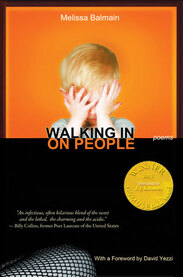Melissa Balmain’s book Walking in on People transfixes readers with the humor of her and her family’s everyday life. The poet's simple language illustrates a play on observation, thought, and vantage point as she tackles marriage, raising children, and pop culture. Delivering lines that are thought provoking and eloquent, she simultaneously keeps the poetry genuine with her direct language. Balmain is boldly “walking in on people” where many choose not to go. This collection shouldn’t, however, be seen as spying, but rather as a different take on the renewal of faith in everyday human nature. The poems in Balmain’s collection have varied subject matter and are intended to be humorous. Readers of more than one personality type should be able to at least smile after entering this poet's world. Because some of the entries are so short, every word has to mean something…and each one does. Walking in on People is constructed in such a way that the poems flow easily from one to the next. It also helps that they are divided into sections so the reader can skip around to the subjects they find more interesting. Many lines can be very funny and innocent at the same time. One of the better examples comes from the titular poem “Walking in on People,” which reads, “I witness at a conference enjambed / of friends rebounding from a recent breakup / and once, two mimes in nothing but their makeup.” Balmain manages to get across a serious point while keeping the words light so the reader and the mood do not become overwhelming. These lines obviously are talking not only about a breakup from the outset, but also about two friends reacting to their perceived hardship.
These poems appeal to a wide audience as the poet brings color to an array of what might seem like mundane, everyday occurrences by adding brilliant wit, humor, and life experience. Balmain’s roles as a wife and mother enliven some of poems, but her experience editing a light-verse online journal clearly shows through. In one poem, “Memo to Self, in Bed,” she writes about the lack of time there is to do daily tasks as well as the various financial stressors and work deadlines that lay heavy on the mind at the end of a long day: "Don’t think, while you are holding him of deadlines / of monster Visa bills you haven’t paid / of NPR reports on gangs and breadlines / and kooks with nukes available for trade.” The images evoked are ones of worry and control about the world surrounding the author and the realization there is only so much one human being can do. The poet calls on people to spend time thinking about things that actually matter rather than the trivial things that can pollute the everyday mindset: “Don’t think of whom you owe a three-course dinner / of editors you wish you had impressed / of whether you should be two sizes thinner / and twice as nice to look at when undressed.” These lines bring to mind what can cause distractions in life and that we need to just let them go. It's also a positive reminder that no one is perfect. Toward the end of "Memo to Self, in Bed," we read: “How you or he (which one?) will soon be facing / long nights where solitaire’s the only game / Don’t think: just wink at him and keep pretending.” These lines indicate that people should take advantage of the quiet, to just be, even if it is only for a second. There will be plenty of time to be alone. Everyone needs to enjoy the pleasant times while they last. Even though good times aren't with us forever, and some days run into one another, maybe some of the good memories of times past can be conjured up in a journey through this collection. Balmain has a distinct simplicity in her language, which immediately connects readers to most of the situations illuminated in the book. One such example can be found in “Tale of a Relationship, In Four Parts.” The poem consists of four words: “Kissing / Hissing / Dissing / Missing.” This piece of Balmain’s work could apply to many different types of relationships, including ones romantic, and how an individual might get through the rough parts. Poems such as this confirm Balmain’s devotion to simple yet complexity prose as well as her reputation of making every word she puts on paper count. After reading Balmain’s poems, one should contemplate and feel free to put themselves in the shoes of at least one piece of her work. Reading any of these poems, as simplistic as the language may be at times, should make the reader stop, think, and appreciate each one as they turn the page. Melissa Balmain, by creating an environment in which readers can not only laugh at the prose but also relate it back to their own lives, has given us a forum where many will fondly reminisce and then look forward to whatever humorous moment might come next. Readers might even be tempted to walk in on a few people of their own.
0 Comments
Leave a Reply. |
Archives
July 2024
Categories
All
|
|
Glassworks is a publication of Rowan University's Master of Arts in Writing 260 Victoria Street • Glassboro, New Jersey 08028 [email protected] |
All Content on this Site (c) 2024 Glassworks
|


 RSS Feed
RSS Feed
